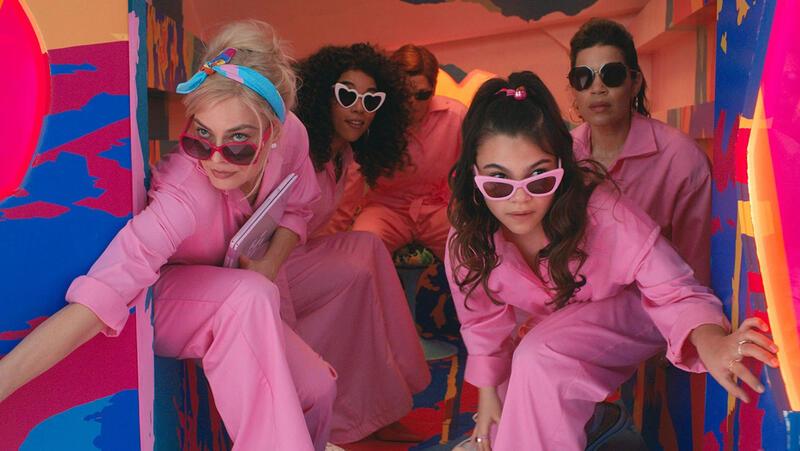Barbie is a Beautiful Golem
I feel better about Barbie (2023) every second I’m away from it. I exhaled big breaths whenever I was watching the genuinely funny studio comedy with dynamite leading performances (Margot Robbie and Ryan Gosling) and a cache of brilliant actors making meals out of supporting roles. Barbie is most successful when it is silly and sweet and heartfelt, and most confused when it uses the lens of a real-world corporation to say anything meaningful about ending the evils of capitalism and patriarchy.
Barbie, like the doll herself, has a hard, plastic, artificial exterior, and sometimes the uniformly excellent acting performances feel like they are plucked from discarded movies with deeper emotional wells. That director Greta Gerwig pulls such heart out of something that should have no soul is a testament to her immense powers as a filmmaker. It also speaks to the ritual of playing with dolls, of breathing life and experience into something inanimate by putting words in her mouth. In other words: Barbie is the prettiest golem story I’ve ever seen.
For the uninitiated, a golem is a protective creature from Jewish folklore. He is big and misunderstood and made of clay. To give him instructions, you write words on paper and put the words into his mouth, and he protects you and your community. The act of playing with a Barbie doll, projecting your hopes and dreams for yourself onto an eight-inch piece of plastic, is vulnerable and hopeful in a similar way. It is the same level of trust and delusion to expect care and understanding from any non-living creature of legend.
We look for these kinds of uncomplicated guardians because it is easy to let go of our human insecurities and fears if we know someone will always be there to protect us against harm. Tongue-in-cheek jokes about the end of misogyny aside, I believe that the truth at the center of Barbie is something about iconography and idolatry, and how our anxieties are valid, but projecting them onto a symbol will never save us. We will all have to save ourselves. If Barbie can do it (and she does!), then so can we.
Gerwig has said she wants Barbie viewers to feel the way she felt as a guest at Shabbat dinner as a child visiting with a close friend’s family. “I remember feeling so safe in that and feeling so, like, enough,” she said. “I want people to feel like I did at Shabbat dinner. I want them to get blessed.” Barbie doesn’t clearly define the line between our universe and the universe depicted, which allows room for both projection and a dark, weird spirituality to slip through the cracks. Rhea Perlman owns two beautiful scenes as Ruth Handler, the Jewish creator of Barbie and the business powerhouse that gave the world Mattel toys. More than girlbossing, Handler’s existence in Barbie made me think about the role of creator—a role human beings love litigating more than anything. Ruth is a ghost, and she’s God, and she’s also a “five-foot-nothing grandma with a double mastectomy and tax evasion issues.” The idea of human beings—and toys that reflect our experience as human beings—made in the image of such a flawed creator reads very Jewish to me. Much is made about the difference between “Old Testament God” and “New Testament God,” with the Jewish version of the story coming off as harsher and less intrinsically divine to people who think divinity means sacred means impenetrable. To me, and I suspect to many other Jews, a God that has fears and holds grudges is divine because there is divinity in learning and human error.
Barbie has created an unbelievable amount of pop cultural buzz, but in the weeks leading up to my Barbenheimer double feature, I found myself worrying about it more than anything else. What if I didn’t like this big summer flick that was practically made for me? What would it say about me and my relationship to womanhood if I couldn’t connect with Barbie, if I couldn’t release any world-changing expectations I’d projected onto a movie about America’s favorite doll? Why was I so tense about the fourth film from a director whose work has always deeply resonated with me?
America Ferrera’s gorgeously-acted Barbie womanhood monologue has been the recipient of a lot of eye-rolls from a lot of people who want more for audiences and more from movies. I, personally, did not learn anything new from it, but I don’t think the point was teaching and stirring audiences to revelation. I think the point was that naming concerns is valuable, even if you do not personally have the power to fix the broken systems that created the concerns. Barbie is imperfect, but that’s the point. My pre-film worries were not unjustified, but they were misplaced. This is just a blockbuster. Barbie is just a doll. These are things that matter; hit movies take the cultural temperature, they cost a lot of money to make, they change people’s lives and the way they talk to and about themselves. But, as Ruth Handler puts it: “We make up things like patriarchy and Barbie to deal with how uncomfortable it is to be human.” Like a golem, she symbolizes safety and triumph without literally existing and physically protecting. She is a symptom, not a cure, but we need symptoms to begin to address the underlying cause.
Barbie is best enjoyed with a group of your girl friends in a crowded theater and a sea of hot pink. Barbie is most interesting and culturally critical when it comments on the drastic measures women take to make men feel comfortable, wanted, seen, and prioritized, and least interesting when it anticipates criticism from both sides of the political spectrum. I am also not 100% sure it knows who it was made for, and I find parts of it very gender essentialist and mean-spirited. But I am glad that it tries to do too much rather than resigning to doing very little, because I think even the parts that fail—the imperfect lumps of clay that coalesce to form something flawed, but useful—are worth the conversation that comes after. Barbie, like Barbie, tries everything once.








Thanks for the rich insights and the education on golem. I will share this at our church's Barbie discussion party with special thanks to you.
Rev. Wyndee
I found the movie to have many innuendos. Having lived almost 80 years, it was an interesting commentary on how far we have come and how far we have slipped in attaining equality for all of us.